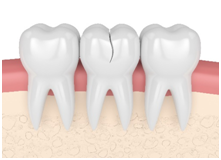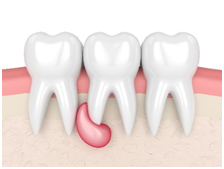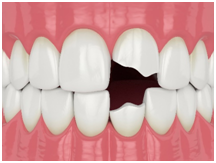Many adults who suffer with headaches may never realize, however, that their dental health may cause or worsen their headache symptoms.
If you find yourself struggling with unexplained headaches, you may need to evaluate your teeth or jaw for any underlying conditions that might factor into your pain. Discover three such issues that can play a role in acute or chronic headaches.
Tooth Damage
Any tooth damage that exposes sensitive nerve tissue can cause pain. However, this pain may not limit itself to the affected tooth. Pain in the tooth’s nerve pulp can travel along the trigeminal nerve to other parts of the head, resulting in what feels like a classic tension headache or light or sound sensitivity, nausea, and vomiting.
A cracked, broken, or severely worn tooth should receive prompt professional care, not only to guard against infection and improve function but also to prevent or relieve pain. Permanent crowns can cover and protect damaged enamel, safeguarding the nerve tissue against unwelcome stimuli and preventing additional damage.
Infections and Abscesses
In addition to triggering nerve pain, a fractured or decayed tooth can also develop a painful bacterial infection. The bacteria destroy the sensitive pulp chamber of the tooth, causing symptoms such as pain, fever, and swelling. It can also invade the jaw, resulting in an abscess.
Diseased nerve tissue can transfer pain to the face or head just as easily as acute damage to the tooth enamel. An abscess in the upper jaw can also produce an acute sinus infection, causing debilitating sinus or migraine headaches.
Fortunately, you can avoid the worst of these complications by treating that nagging toothache as quickly as possible. Root canal treatment can often save even a seriously infected tooth, while antibiotics can clear up any infection in surrounding tissues. As the infection recedes, so will your headaches.
Bruxism
The unconscious grinding or clenching of teeth can produce chronic headaches. This problem, known as bruxism, typically occurs during sleep. Emotional stress and alignment problems between the top and bottom teeth can fatigue the jaw muscles, wear down the enamel, or even lead to tooth fractures.
The tooth damage from bruxism can transfer nerve pain from the teeth into the face and head. Meanwhile, strain on the jaw muscles can cause pain that spreads from these muscles to your head, resulting in a TMJ-related tension headache.
Your dentist can help you ward off bruxism-related headaches. You may need to have a custom night guard fitted to reduce overnight jaw tension and enamel wear.
If you suspect that your headache problem might actually stem from a dental problem, start your search for solutions at Maidstone Dental & Implant Centre today on 01296 712264to schedule an evaluation and learn more about dental treatment for headaches.








